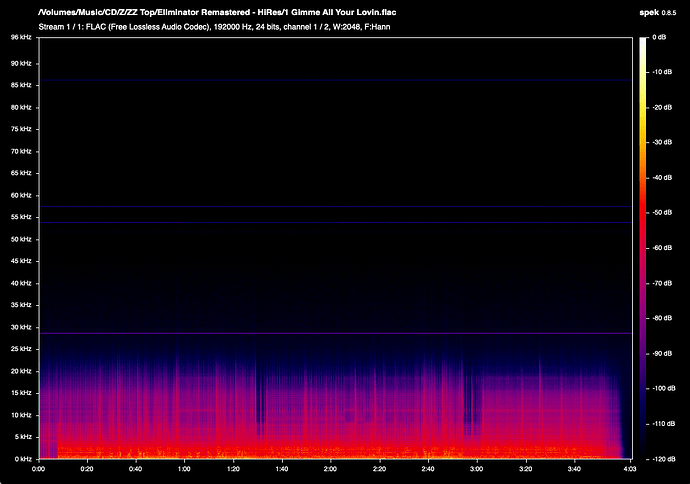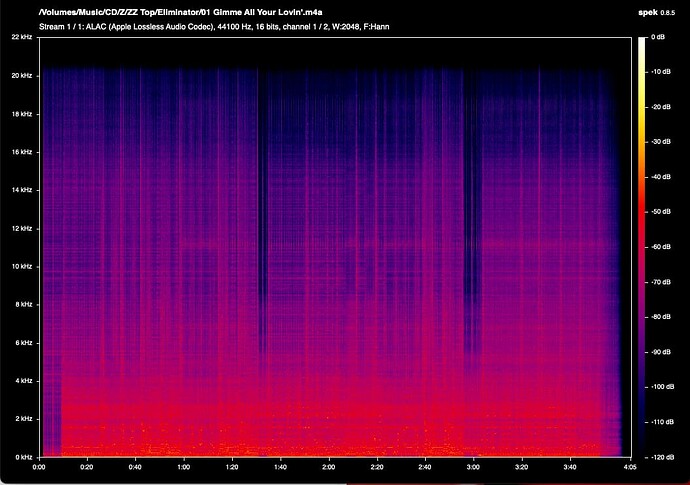That is likely because you’re not sitting close enough to the screen, which is a common problem. For Full HD (aka 1080p, 2K), the optimal viewing distance is about 1.6x the screen diagonal. For 4K, it reduces to about 0.8x. For a 60in. diagonal, you should sit at most 48in. (4ft. or 1.2m) from the screen to take full advantage of 4K. There is a misconception here that higher video resolutions are about sharper images, when they really are about wider viewing angles and thus more immersive experiences.
I have two spectrograms of ZZ Top Eliminator. One is 192/24, the other is 44/14.
192/24
44/16
As you can see, in the 192/24 the highest frequencies are somewhere at 22kHz. Same as in the 44/16 file.
Even if you hear perfectly well. It is hard to hear a difference. Above 22kHz you have silence. Well, you have 4 artefacts above 25kHz.
Maybe they sound different, because they are mastered differently. But definitely not because one is HiRes.
A very good explanation and matches my thoughts and something everyone should take the time to read and consider. I am reminded of a line in a movie that goes something like “you don’t want the truth, you cant handle the truth”. For many audiophiles who have just paid big money on streamers and dacs that can process not only 24/192 but up to 24/ 768 dont want to be told that you cant hear it, makes them look a bit foolish, emperors new clothes syndrome. However, there is value in buying more expensive gear just because it looks and feels nicer so I myself would certainly buy better gear for that reason. Its a bit like buying fishing rods. A cheap one will do the job but one that has been hand made is just a pleasure to use even if you dont catch a fish.
A very interesting explanation and many truths and for us baby boomers who are flat out hearing anything above 10khz makes the quest for hires even more of a non event. I am curious though, given all the knowledge you appear to have, what hifi equipment you own.
Well we all agree Mastering is Master and quality of engineering ranks …But what if the recording is in 192/24 then downsampled to 16/44
Is something lost ?
A bit like if a tree falls in the forest scenario

If the original recording actually had some content above 20KHz (or a dynamic range that would not only destroy your ears but likely wipe out your neighborhood if reproduced at audible levels) then yes, something would be lost. A better question would be is something (anything) audible lost?
What would be lost would not be heard anyway. Then again, whatever is there that would be lost may not be music at all, just conversion artifacts, so it’s good it’s not heard even when it’s there.
That’s why the question. Whether the high-frequency content is “music” or just conversion artifacts is better asked of the artist.
Wouldn’t that be like asking directors about the UV content in their movies? (Besides, I think sound engineers might know better than artists.)
If somebody really wanted to have that 30KHz tone in the recording, because that’s his artistic vision, who are we to argue?
That sounds like subliminal messaging.
Isn’t most of “high-end” audio just that?


